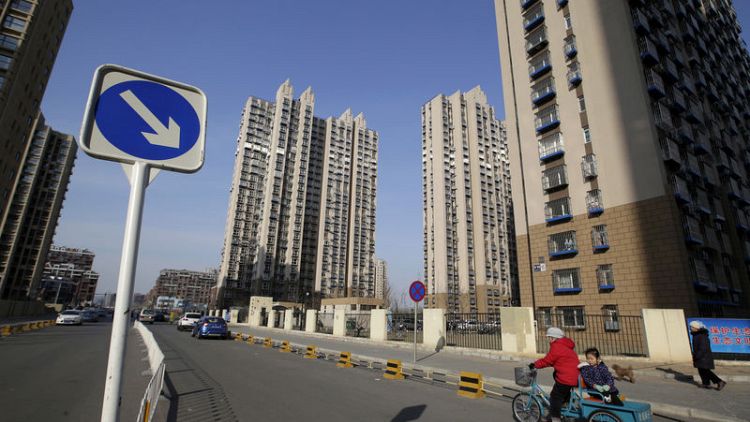By Patturaja Murugaboopathy and Clare Jim
BENGALURU/HONG KONG (Reuters) - China's developers, the country's most leveraged sector, have finally got their rising debt piles under control and some even boast record amounts of cash, powered by strong earnings growth and restrained expansion, a Reuters analysis showed.
That should be a relief to investors worried about potential corporate defaults as China Inc faces a record $1.5 trillion of corporate bonds maturing in the next two years.
But it is also a warning sign that the country's buoyant property market is slowing down, with policy uncertainty keeping developers jittery and delaying investment.
Following a furious boom, China has tightened regulatory controls over its massive property market since mid-2016. But home prices have continued to go up, even as economic growth slows, and managing risks in the sector remains a priority.
"The amount of cash is high, because they have held back acquisitions and construction expenditures. They have to replenish their pipelines of projects going forward," said Phillip Zhong, senior equity analyst at Morningstar.
The government's efforts to rein in excessive borrowing resulted in a record number of bond defaults in China last year, and market experts expect the trend to continue this year. However, they say major property developers, especially the Hong Kong-listed ones, are better equipped to handle the storm as their profitability and balance sheets have strengthened.
"The protection (against default risks) is higher due to lower inventory in the system and developers can easily deleverage if they slow down the land acquisition," said John Lam, head of Hong Kong and China real estate research at UBS.
A Reuters analysis of 45 Hong Kong-listed mainland developers' balance sheets showed their combined cash and short-term investments rose to a record 1.1 trillion yuan ($14.5 billion) at the end of 2018, while net debt-to-core earnings ratio fell to 5.14 percent, the lowest in four years.
For graphic on Chinese property developers' debt ratio, click: https://tmsnrt.rs/2I28eng
Another analysis of 50 developers listed in mainland China showed their average debt-to-equity ratio fell to 1.73 at the end of March quarter, the lowest since 2013.
For graphic on Chinese property developers' cash levels, click: https://tmsnrt.rs/2I0L2WG
MARKET SLOWING DOWN?
China's land sales by value rebounded 6% in the first four months of this year, according to real estate researcher CREIS, with the premiums developers paid for land rising sharply, as credit conditions and purchase requirements eased.
The rebound took some firms by surprise and prompted caution, because in the second half of last year many land auctions failed to secure bids as developers faced tight credit conditions and thinning profit margins following the prolonged government campaign to rein in property prices.
With the market likely to see tapering growth -- UBS's Lam forecasts Chinese developers' earnings will rise 25% this year and 20% on average in the next three years. Experts says developers are likely to their keep debt ratios stable.
"Unless developers suddenly get very aggressive on landbanking, but that'd be unlikely because of the price caps," J.P. Morgan's head of China property research Ryan Li said, referring to the government restrictions on how much developers can set the selling prices in different cities.
Chinese developers sold a record amount of offshore bonds in the first quarter and most of the proceeds went to refinancing rather than building up landbanks due to regulatory controls.
(Additional Reporting by Gaurav Dogra in Bengaluru; Editing by Miyoung Kim and Jacqueline Wong)



